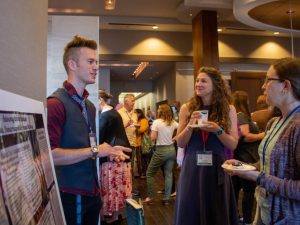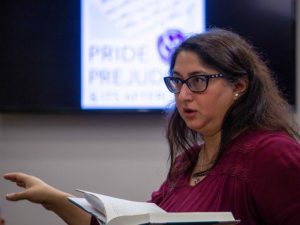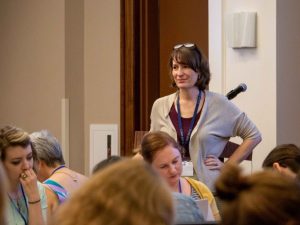Jane Austen Summer Program Unites Fans, Scholars
August 5, 2019College of Arts & Sciences
Jane Austen’s work has inspired films and television shows, sequels and spin-offs, and even tabletop role-playing games. Her beloved novel, Pride and Prejudice, with its plethora of subsequent re-imaginings, was the focus of this year’s Jane Austen Summer Program, organized by faculty and graduate students in the College of Arts and Sciences.
The annual conference, hosted by the English and comparative literature department, celebrated its seventh year with the theme “Pride and Prejudice and its Afterlives.” JASP is part fan convention and part academic conference, offering screenings of popular adaptations, Regency-era hairstyling workshops and an evening ball alongside poster presentations and plenary sessions.
English and comparative literature associate professor Inger Brodey, who co-founded the conference with fellow professor James Thompson, appreciates the atmosphere that JASP fosters. Amateur Austenites sit beside seasoned scholars, and undergraduates present to attendees as their graduate student instructors lead panels explaining the historical or societal contexts of Regency England and more.
“I don’t view it as just academics bringing information to the public,” said Brodey. “I really think the public plays a huge role in bringing these things to life for the academics. I think this is an embodiment of what public humanities should be.”
JASP has attracted Austen fans across the country and the globe (this year, as far as Brazil and Hong Kong), and across the generations, with a 13-year-old attending after winning an essay contest held in conjunction with PlayMakers Repertory Company and Carolina Performing Arts.
Traditionally, an undergraduate summer session course has been taught alongside the conference. This was graduate student Michele Robinson’s first time teaching “Studies in Jane Austen.” Although she has participated in some capacity each year, including leading panels and performing in theatrical skits, teaching gave her the opportunity to approach Austen’s works in a multitude of ways.
Robinson, an English and comparative literature doctoral candidate who is also pursuing a women’s and gender studies minor, believes JASP reinvigorates her own research about how women are defined by spaces in Victorian literature.
“There are ways in which certain avenues of research have blossomed before my eyes and made me want to expand and be more invested in interdisciplinary projects,” she said.
And no matter the theme of the conference, which changes each year, Robinson said she always takes away something new.
“What really gets me [excited] about this conference is that it combines both lighthearted elements and responses to Jane Austen with some really deep, critical commentary that is both interesting and multifaceted,” she said.
Undergraduates Present Work Alongside Seasoned Scholars

It’s a feeling echoed by one of Robinson’s students, Brett Harris ’21. He hadn’t read Pride and Prejudice until this course, and found the conference enriching, particularly with the blend of attendees.
“It’s been really nice to get [additional] grounding in the historical context and to have outside, non-academic perspectives [with] people who are insanely into Jane Austen,” said Harris, a contemporary European studies and English and comparative literature double major.
Like the rest of his classmates, Harris was tasked with analyzing a Pride and Prejudice novel adaptation. He chose Unmarriageable by Soniah Kamal, one of the conference’s invited authors.
Knowing that the author of the book he researched could walk by his poster at any time created an added layer of exhilaration and anticipation.
“She fleshed out different parts of my argument that I had been a little nervous or tentative about,” he reflected. And hearing from Kamal directly at her author Q&A reaffirmed his analysis of her book. “The fact that I was somehow on the same wavelength with this woman who wrote this amazing book was mind-blowing.”
Brodey said students have an opportunity to flex their communicative skills while providing a deep analysis of themes related to a novel over 200 years old.
“Learning how to present and interact with others is the only way the humanities is going to keep its vitality,” said Brodey. “You have to be able to show that even if it isn’t relevant to daily life, that you can communicate it in a relevant way to others.”
A South Asian Perspective on Austen

It’s not unlike the ways that the conference’s invited authors brought their contemporary retellings of Pride and Prejudice to new audiences.
While JASP has featured authors of adaptations in previous years, this was the first conference to feature three authors of recent adaptations of Pride and Prejudice – all from a South Asian perspective.
There was Kamal’s, whose parallel adaptation set in Pakistan reimagined the Bennett family as the Binats. Uzma Jalaluddin’s Ayesha at Last places the titular character in a modern, close-knit Toronto Muslim community. And Sonali Dev’s Pride, Prejudice, and Other Flavors features an Elizabeth-like heroine as a successful Indian-American neurosurgeon paired with a Darcy-like aspiring chef.
The authors were encouraged to be active participants in JASP, attending other plenary sessions and even the Regency Ball. Kamal also joined creative writing professor Randall Kenan for a writing workshop, where they guided and advised participants in crafting their own adaptations.
Interactive Forums Benefit High School Teachers
While scholarships have been offered to teachers to further their own professional development through instructor-specific presentations, this year’s conference introduced a hands-on, interactive session tailored to teachers.

Kathryn Edelstein credits Jane Austen as one of the reasons she decided to teach literature, which she now does at East Chapel Hill High School. Edelstein has previously presented to fellow educators at JASP, but the new format allowed them to collaborate on creative ways to integrate Austen’s work into their curricula.
“JASP provides this immersive experience for teachers in a really unique way, I think,” said Edelstein. “JASP is about bringing literature to life for people, and this is something that will really enrich classrooms as well.”
Far-Reaching and Long-Standing Fandom
How does Jane Austen endure and inspire countless adaptations, year after year?
That’s the million-dollar question, said Robinson. When asked, she, Brodey and Edelstein offered possibilities: the social satire, the allure of romance (or perhaps just Mr. Darcy!) and the commentary on class and morality.
“I think it’s a unique combination of those things that come together in Austen that make us return to the text and that has given authors a number of ways of approaching that question,” Robinson said.
Harris said listening to Kamal’s talk about her inspiration and the universality of certain themes drove that home.
“The fact that it does resonate with so many people and that they can find freedom in adapting what she already made, find themselves and make it real for others, really speaks to the power of adaptation,” he said.
Photos by Kristen Chavez ’13
